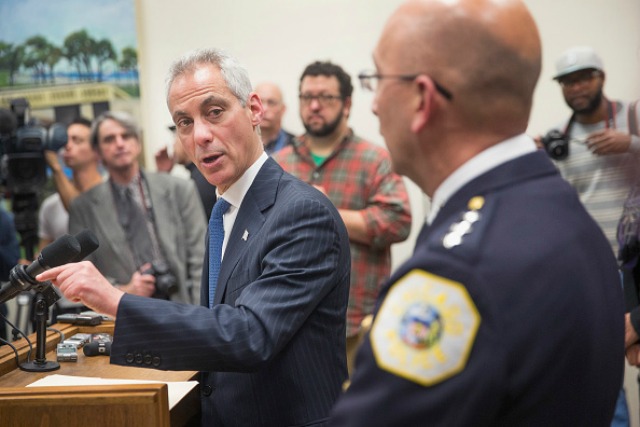Rahm Offers An Awful, Empty Apology
By Rachel Cromidas in News on Dec 9, 2015 6:00PM

Interim Chicago Police Superintendant John Escalante (R) listens as Mayor Rahm Emanuel takes questions during a press conference on December 7, 2015 in Chicago, Illinois. (Photo by Scott Olson/Getty Images)
Mayor Rahm Emanuel hauled the city's aldermen and dozens of pre-approved reporters and members of the public into City Hall Wednesday morning to deliver a 9-page speech on police accountability that had few new things to say on the slew of policing scandals that have marred his second term.
His speech began with an unexpected apology, absent from the prepared remarks shared with reporters.
"We need a painful but honest reckoning of what went wrong," he said. "The first step in that journey is my step. And I’m sorry."
But that reckoning of what went wrong is not what followed in the rest of Emanuel's speech, which otherwise hewed to talking points about gun violence and gang activity reminiscent of his May inaugural address and re-hashed announcements he's already made in the wake of the policing scandal.
Emanuel continued to deflect responsibility for the Laquan McDonald shooting, the suppression of the unambiguously tragic dashcam video, and a host of other recent police misconduct cases onto the recently-ousted leaders of the police department, inadequate police trainings, an ineffectual Independent Police Review Authority, a culture of silence among police, bad apples within the police force, the normalization of gun violence in Chicago's poorest neighborhoods, bad parenting, the seductions of gang life ... and anything other than his own leadership decisions.
Since the McDonald video was released last month, Emanuel has begun overhauling the police department, ousting leaders and calling for the dismantling of an entrenched "code of silence" that might be preventing officers from speaking out when they see other officers behaving badly. But he has so far failed to address the role his own oversights have played in allowing systemic problems to go unchecked right up until his administration was compelled by a court to release the tide-turning video.
One problem Emanuel could have blamed in his speech—but didn't quite—would have been the evidence of systemic racism and racial profiling within the Chicago Police Department, specifically.
"We have read the studies and articles on racial profiling, the lack of diversity in our police ranks across the country, and the disproportionate levels of enforcement towards people of color," he said. "It is my deepest hope that we continue to address these issues in a peaceful, passionate, and productive way, but I fully understand that the public’s patience is limited."
In perhaps the most moving part of his speech, and the closest he comes to naming the double-standard in how youth of color are treated by Chicago police officers as compared to young white people, Emanuel described a recent conversation between himself and a young man with a criminal record, whose race he didn't mention. (This portion of the speech is absent from the prepared text posted online by mayoral aides.)
"One young man asked me a simple question that gets to the core of what we're talking about: 'Do you think the police would ever treat you the way they treat me?'And the answer is, no. And that is wrong. And that has to change in this city. No citizen is a second class citizen in the city of Chicago. If my children are treated one way, every child is treated the same way. There is one standard for our young men."
Emanuel again came close to addressing racial profiling a few minutes later, when he said police officers and community members alike should learn how to "see past their roles, to their souls" when interacting on the streets.
"The officer can see dreadlocks and tattoos," he said, "or a student and an artist."
After the speech, Ald. Roderick Sawyer (6th Ward) who has been a vocal critic of the police department in recent months as chairman of the council's Black Caucus, told the Sun-Times he considered Rahm's apology genuine.
"I won't say I was shocked, but I was pleasantly surprised by the tenor of the speech and the emotion of it ... He continued his concept of owning it," Sawyer said. "Now we've got to get in to the details. Apology for what?"